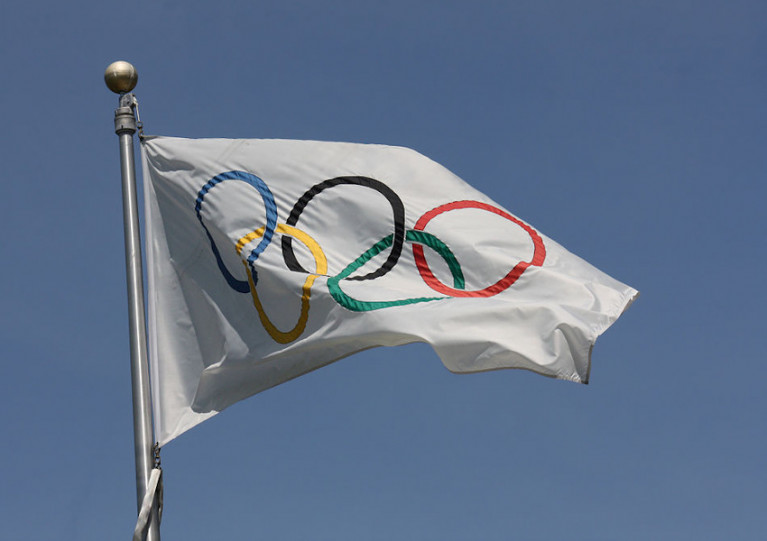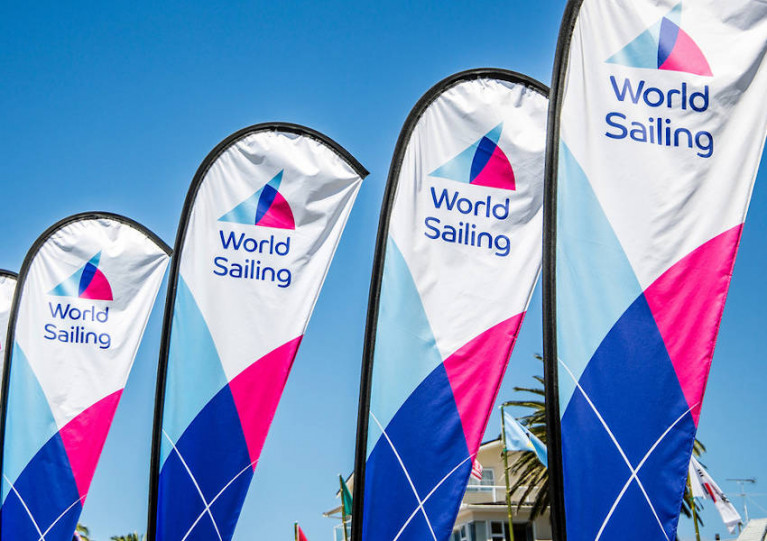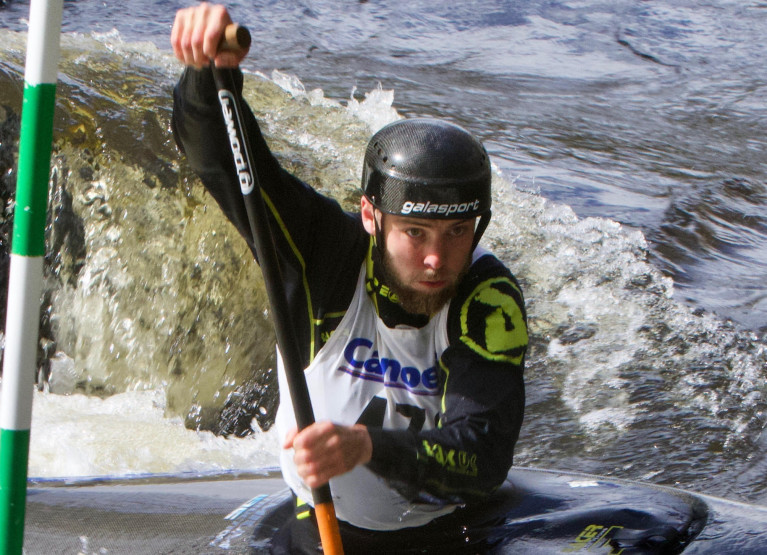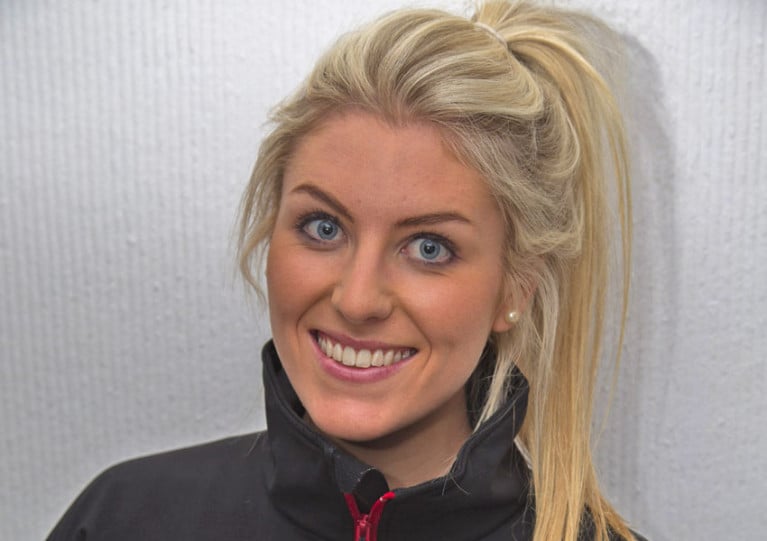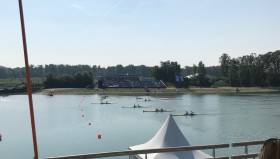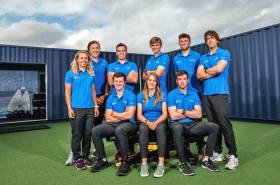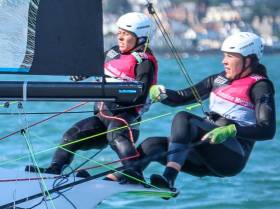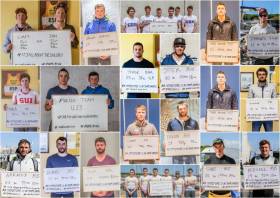Displaying items by tag: Olympics
Eve McMahon Will Be Driven to Success in New Mercedes-Benz Van for Irish Olympic Sailing Team
Ireland’s Olympic sailing team has started the New Year with a fair wind in its sails, having welcomed a new addition to its fleet of commercial vehicles in the shape of a new Mercedes-Benz Vito van.
The second of its kind to be added to the fleet, the Vito will soon be put through its paces transporting the team’s boats and equipment to international training camps and competitions throughout Europe in destinations such as Portugal, Italy and, significantly, the Olympic sailing venue of Marseille.
No stranger to the Irish sailing community, Mercedes-Benz has supported a number of water sport activities over the years, most notably in its sponsorship of Ireland’s Olympic medal-winning sailor Annalise Murphy in her preparations for the Rio and Tokyo Olympic Games.
Fittingly, the predominant user of this new vehicle will be Howth Yacht Club’s Eve McMahon, the current Youth World Champion in Murphy’s old class the ILCA 6 (formerly Laser Radial) who is hotly tipped for Olympic success of her own, at Paris 2024 and beyond.
Tokyo 2020 President Says Olympics ‘Will Be Scrapped’ If Coronavirus Threatens Further Delay
The president of Tokyo 2020 says the Olympic Games already postponed to next year “will be scrapped” if it cannot go ahead at its rescheduled date.
As RTE News reports, Yoshiro Mori was responding to concerns that a vaccine for the coronavirus — which has infected more than three million and killed over 200,000 worldwide — may not be readily available before July 2021, when the delayed Tokyo games are now set to begin.
But Mori, a former prime minister of Japan, said he was confident that “we will have won the battle” against Covid-19 by next summer.
A Tokyo 2020 spokesperson later insisted that Mori’s comment about potentially cancelling the next Olympics was “in his own thoughts”.
RTÉ News has more on the story HERE.
World Sailing Claimed To Be In Dire Financial Straits In Wake Of Olympics Postponement
A vice-president of World Sailing has appealed for the International Olympic Committee (IOC) to advance its share of revenue from Tokyo 2020 as the governing body faces dire financial straits.
Scott Perry told insidethegames that the postponement of the next Olympic Games from this summer to next year, amid the Covid-19 pandemic that has seen events cancelled the world over, has worsened an already precarious funding situation.
World Sailing had been expecting a payout in the region of €12 million from the Tokyo games dividend, which would have filled a predicted hole in its accounts this year.
“The state of World Sailing’s finances were challenged before the Covid-19 crisis and the subsequent postponement of the Olympics,” Perry said.
“The postponement of the Olympics has made our financial challenges much more acute.
“Along with most International Federations we would dearly like an advance from the IOC but at this stage we don’t have any indication that an advance will be forthcoming.”
Insidethegames has more on the story HERE.
Canoe Slalom racer Liam Jegou has become the first Team Ireland athlete to be selected for the Tokyo Olympic Games this summer. Originally from Ballyvaughan, Co. Clare, the France-based Jegou has already stamped his mark on the international stage, winning silver in the 2014 Junior World Championships and bronze in the 2019 U23 World Championships. The 24-year-old will compete in the C1 category at the Kasai Canoe Slalom Centre in Tokyo from the 26-27 July 2020.
Jegou is the second Irish athlete ever to compete in the C1 Canoe Slalom at the Olympic Games, with the only other athlete being Mike Corcoran, who last competed in Atlanta 1996, the year in which Jegou was born.
Jegou said he was intent on seizing his opportunity in Tokyo. “Being an Olympian has always been one of my biggest dreams. I started training when I was 11 or 12, the past month has been unbelievable knowing that I am going to compete for Team Ireland in the Olympics.
“In my sport the Olympics is everything, it’s what everyone works for in their sport. It’s such a select thing; there’s only one athlete per nation that gets to go and when you to go you just want to give it your all. Most people only get to go to the Games once or twice in their lives, and I’m certainly not going to let the opportunity pass me.”
Olympic Federation of Ireland Chef de Mission for Tokyo 2020, Tricia Heberle said: “It’s very exciting, this is our first athlete to be approved as part of Team Ireland for the 2020 Olympics – it’s great for the sport and great for Liam.
“There is a tremendous amount of work that goes on behind the scenes to support sports and our athletes to qualify and perform at the Games. It’s a real team effort with our National Federations, the Sport Ireland Institute and a range of other support groups working together with the athletes as our priority. Liam has his own story and we are so pleased to be supporting the next chapter in his journey as he prepares for the Tokyo Olympic Games.”
Canoeing Ireland Performance Director Jon Mackey described the significance of this for his sport: It’s big for any sport to qualify for an Olympic Games. For canoeing, it’s great for the exposure of the sport, we are relatively small, and it’s great to tap into the proud tradition of Irish canoeing at the Olympic Games.”
Jegou was nominated for the 2020 slot after finishing on top in the three-race selection criteria, which included the World Championships in Spain, the event in which Ireland qualified the coveted Olympic berth courtesy of Robert Hendrick.
The difference between C1 and K1 in Canoeing is that the C1 category involves the athletes using a single-bladed paddle to propel the boat forward while kneeling in the canoe. The K1 athlete is seated and uses a double bladed paddle. C1 Canoe Slalom has been on the Olympic programme since 1992 as a men’s event, and 2020 is the first year that a C1 women’s event is included, in the IOC move towards a gender-balanced games.
Ireland has a rich history in K1 Canoe Slalom, with Ian Wiley and Eoin Rheinisch competing in the event for three Olympic Games each between 1992 and 2012. Eadaoin Ní Challarain was the first Irish female canoe slalom racer, competing in the K1 in 2000 and 2004, and in London 2012 Hannah Craig raced in this event also.
This is the first official Team Ireland Tokyo team announcement. Many sports have ongoing selections and competitions with team announcements expected to come more frequently as we approach the summer, with the final announcement scheduled for the beginning of July.
British Sailing Chief Forecasts Five-Medal Haul At Tokyo 2020
British Sailing’s performance director Ian Walker has predicted a five-medal haul for Team GB at this summer’s Olympic Games in Tokyo.
In a recent sports podcast conversation, as reported on Sailweb, the boss of the UK’s Olympic sailing squad would not be drawn on what medals they would take home, nor in which class.
But the former Irish Green Dragon skipper, and RYA racing director, did indicate that the team were capable of greater things provided the conditions were more windy than light.
Irish 49erFX sailor Saskia Tidey is among those who will be in contention with Team GB at this summer’s Olympic Games.
She and her sailing partner Charlotte Dobson were selected last October and head to Enoshima as serious medal contenders.
This follows a string of successes since forming their partnership in 2017 when Tidey switched from Team Ireland due to a lack of opportunity here.
Dukarska and Crowley Take Olympic Place For Ireland Pair
#Rowing: Monika Dukarska and Aileen Crowley booked another place for Ireland at the Tokyo Olympic Games this morning. They took second in the pairs B Final at the World Championships in Linz, well inside the top five which would have qualified the boat.
They led early on, but were passed by Romania in the third quarter. As they field chasing the Olympic spots closed, Ireland clung on to second.
(Irish interest)
Women
Pair - B Final (First Five book Olympic places for boat): 1 Romania 7:18.88, 2 Ireland (A Crowley, M Dukarska) 7:20.68.
Lightweight Double Sculls - C Final (Places 13 to 18) 1 China 7:00.82; 5 Ireland (A Casey, D Walsh) 7:10.52.
Annalise Murphy has received a major boost to her 49erFX campaign for Tokyo 2020 as Mercedes-Benz has extended its support to the Olympic silver medallist.
The National Yacht Club hero recently resumed training without direct funding support from Sport Ireland, as her absence from competition due to Volvo Ocean Race commitments ruled her out of the €40,000-per-annum programme.
But now the 29-year-old Rathfarnham sailing star has renewed her ‘Tier One’ partnership arrangement with Mercedes-Benz, availing of a new X-Class pickup to transport her and team-mate Katie Tingle to events here in Ireland and abroad.
“Having the Mercedes-Benz X-Class is a major boost to my training regime and my ambitions for Tokyo,” she says. “I am really looking forward to giving my preparation the X-tra power that the stylish new X-Class delivers.”
Soon to be a regular sight at 49erFX events, the 190hp X-Class is finished in the Kabara black, silver and grey livery similar to that on her previous Mercedes-Benz Vito Mixto van.
Equipped to tow her and Katie’s 49erFX, its features include 4MATIC 4x4 automatic transmission, chrome style bar, bed liner and bed cover in body-matching colour, reversing camera, cruise control power, rear sliding window and a style pack that includes roof rails and side steps.
Wishing Annalise every success on her road to Tokyo, Fergus Conheady, sales manager for Mercedes-Benz commercial vehicles, said: “We are proud to continue our support for Annalise, one of Ireland’s most admired Olympians.”
The renewed support for Annalise Murphy could not come at a better time, as she and Katie prepare for their first big test of their qualifying campaign at the World Cup event in Genoa, Italy next week.
Two of Ireland’s most promising sailors in Aoife Hopkins and Katie Tingle have been the subject of separate profiles in recent days.
Katie Tingle has been making her big comeback after a broken arm put her and Annalise Murphy’s 49erFX training regimen on pause last autumn.
But it’s also been part of a longer return for the Cork sailor, who swapped competitive racing for coaching after success in the Optimist class as a junior last decade.
A reconnection with former junior peer Annalise on the Wednesday night scene in Dublin led to a fateful phone call a year ago, from the Olympic silver medallist to the primary school teacher: did Katie want to join her 49erFX Olympic campaign?
“I don’t think she’d have asked me if she didn’t think I could do it and I wouldn’t have said yes if I didn’t think deep down that I could do it either,” Katie tells The42.ie.
The 29-year-old was already deep into training and conditioning when Annalise returned from her stint in the Volvo Ocean Race, and the two started getting to grips with their new boat on Dublin Bay — the Olympian learning from Katie who had previous experience in two-handed dinghies.
However, a freak incident just weeks into training left Katie with a broken arm — and out of the water for four crucial months.
As needs must, Annalise shortly after resumed training over the winter in the warmer climes of Portugal, with Adam Hyland in Katie’s stead — while Katie hit the gym as soon as doctors allowed get back on the road to sailing fitness.
Earlier this year Annalise and Katie, how fully healed up, reunited and got back in their groove with the challenging 49erFX as their first big test — and first Tokyo 2020 qualifier — looms in Genoa just two weeks from now.
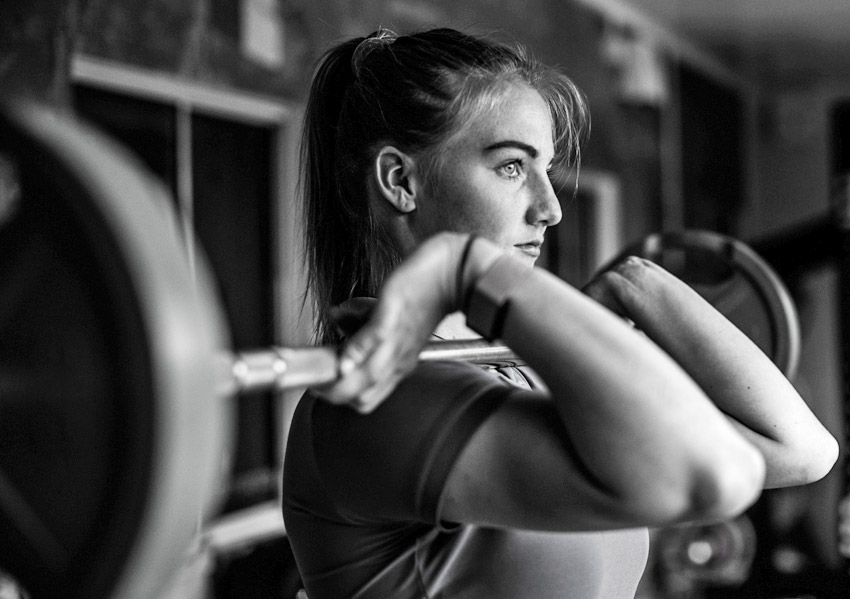 Aoife Hopkins weight training | Photo: Irish Sailing
Aoife Hopkins weight training | Photo: Irish Sailing
Another young sailor who faces a big test in Genoa is Howth Yacht Club’s Aoife Hopkins.
The Laser Radial ace not only steps into the significant gap left by Annalise Murphy, whose Rio 2016 silver medal was in the class — she’s also in competition with teammate Aisling Keller for the single slot available to Ireland.
Aoife tells The Irish Times how she juggles the training regimen of her Tokyo 2020 campaign with the demands of her maths degree at Trinity College, not to mention the various expenses associated with performance sailing at the highest level.
In a boost to their aspirations, Aoife and her fellow performance sailors now benefit from Irish Sailing's new Performance Headquarters in Dun Laoghaire, as previously reported on Afloat.ie.
Annalise Murphy Back In Training With 49erFX — But Without Sport Ireland Direct Funding
The Irish Times reported earlier this month that Irish Olympic medallist Annalise Murphy no longer has her direct funding support from Sport Ireland.
Performance in competition is a prerequisite for the €40,000-per-annum support under the international carding scheme, also known as the ‘podium’ grand.
However, 29-year-old Annalise moved on from the Laser Radial class after her silver medal win in Rio in 2016.
She spent a number of months in 2017 and 2018 sailing in the Volvo Ocean Race before taking up the 49erFX with a view to qualifying for the Olympics in Tokyo next year.
Annalise recently resumed winter trials with her new boat in Portugal, joined by sailing partner Katie Tingle now recovered from an arm injury sustained last year.
Their first competition as a duo is expected be the Sailing World Cup series regatta in Genoa, Italy this April.
And both will continue to be supported by Irish Sailing, with high performance director James O’Callaghan saying: “The important thing is that [Annalise is] full on campaigning for Tokyo, and we’re delighted to have her back.”
The Irish Times has more on the story HERE.
Special World Sailing Council Meeting Confirms Olympic Keelboat Event Over Finn Class
Minutes of the meeting that decided the inclusion of an Olympic keelboat event in place of the Finn class have been confirmed by the World Sailing council, according to Sail World.
Controversy has arisen after last month’s decision at World Sailing’s AGM in Florida and the publication of the draft minutes, when four members claimed their electronic votes were recorded incorrectly.
However, in a special teleconference last Friday 21 December, World Sailing’s council voted 22-11 with two abstentions to confirm the previously disputed minutes.
It means that the Mixed Two Person Offshore Keelboat event will go ahead at the Paris Olympics in 2024 — with no more room for Finn sailors.
Ireland has two in the Finn — Oisin McClelland and Fionn Lyden — competing for a place at Tokyo 2020, what’s now the last Olympic Games for the class. The move has been eyed with interest by Irish offshore sailors.
Sail World has further details of last weekend’s special World Sailing council meeting.



























